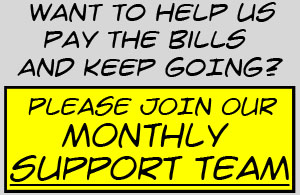
What happens when the State wages war on Mommy and Daddy?
What happens when the State assumes the role of Mommy and Daddy after killing Mommy and Daddy?
What happens when the State does the same to the church?
Put another way: What does it look like when the State purposefully supplants and absorbs the God-given authority and responsibility of the family and the church?
What does it look like when the State “helps” people avoid the relationships, accountability, and authority structures provided by God through family and church government?
Well, it looks like a disaster, that’s what.
It looks like ‘Merica.
When the State assumes power over areas of life reserved for management by other spheres of authority – like families and the church in children’s education, form example – then march toward increasing darkness, bondage, and despair has been assured. As generation upon generation is shoveled into this unbiblical approach to life, culture, and civilization, the carnage builds, the body count rises, and the spirit of despair deepens.
The modern culmination of our long, multigenerational march into darkness as Americans was (perhaps inadvertently) chronicled in a painfully compelling fashion last week in a Washington Post article entitled: One family. Four generations of disability benefits. Will it continue?
As I read the article, I was captivated, horrified, and even hopeful all at once. Captivated by the multigenerational depth and depravity of our System of systems here in “the land of the free” and the home of the NSA. Horrified by what this System routinely does to tens of millions of people each day (and the worse that it has planned for the next generation). Yet hopeful that the light shining brightly now on the consequences of our America idolatry and embrace of Statism might finally be used by God to wake us up, inspiring conviction, repentance, restoration, and salvation from the hell we’ve created for ourselves, our children, and generations to come thereafter.
So it is that I ask you to carefully consider the content of this Washington Post piece:
PEMISCOT COUNTY, Mo. — The food was nearly gone and the bills were going unpaid, but they still had their pills, and that was what they thought of as the sky brightened and they awoke, one by one. First came Kathy Strait, 55, who withdrew six pills from a miniature backpack and swallowed them. Then emerged her daughter, Franny Tidwell, 32, who rummaged through 29 bottles of medication atop the refrigerator and brought down her own: oxcarbazepine for bipolar disorder, fluoxetine for depression, an opiate for pain. She next reached for two green bottles of Tenex, a medication for hyperactivity, filled two glasses with water and said, “Come here, boys.”
The boys were identical twins William and Dale, 10. They were the fourth generation in this family to receive federal disability checks, and the first to be declared no longer disabled and have them taken away. In days that had grown increasingly tense, as debts mounted and desperation grew to prove that the twins should be on disability, this was always the worst time, before the medication kicked in, when the mobile home was filled with the sounds of children fighting, dogs barking, adults yelling, television volume turned up.
And so went another morning, loud and chaotic, right up until the moment someone dropped the puppy.
As it fell the four feet to the ground, the trailer suddenly quieted. The four children stopped fighting. The two adults stopped yelling. Then the weeks-old puppy hit the scuffed linoleum floor, whimpered softly, and events, no longer suspended, began to unfold again.
“It’s dying,” Dale said, looking at the cocoa-colored dog, which had gone limp. “It’s dying. It’s dying.”
“It might have snapped its neck,” Kathy said.
William looked at the puppy, then at the medications collected above the refrigerator, then at his mother, Franny, who wasn’t saying anything.
“Mommy, give him some medicine to keep him alive,” William said.
“He’s dead,” Dale said.
“Give him some pain medicine!” William said.
“Your puppy just died,” Dale said.
“Give him some pain medicine!” William said again.
Talk of medications, of diagnoses, of monthly checks that never seem to cover every need — these are the constants in households like this one, composed of multiple generations of people living on disability. Little-studied and largely unreported, such families have become familiar in rural communities reshaped by a decades-long surge that swelled the nation’s disability rolls by millions before declining slightly in 2015 as older beneficiaries aged into retirement benefits, according to interviews with social workers, lawyers, school officials, academics and rural residents.
How to visualize the growth in disability in the United States? One way is to think of a map. Rural communities, where on average 9.1 percent of working-age people are on disability — nearly twice the urban rate and 40 percent higher than the national average — are in a brighter shade than cities. An even brighter hue then spreads from Appalachia into the Deep South and out into Missouri, where rates are higher yet, places economists have called “disability belts.” The brightest color of all can be found in 102 counties, mostly within these belts, where a Washington Post analysis of federal statistics estimates that, at minimum, about 1 in 6 working-age residents draw disability checks.
As the number of working-age Americans receiving disability rose from 7.7 million in 1996 to 13 million in 2015, so did the number of households with multiple family members on disability, climbing from an estimated 525,000 in 2000 to an estimated 850,000 in 2015, according to a Post analysis of census data. The analysis is probably an undercount.
A separate Post examination of census data found that households reporting at least one disabled adult are three times as likely to report having a disabled child, too, although most households affected by disability report only one disabled member. Multigenerational disability, The Post found, is far more common in poor families.
“I’ve been aware of it my whole professional life,” said Michael L. Price, a demographer who retired from the University of Louisville in 2013. “In eastern Kentucky and other rural areas, you’re more likely to have intergenerational households, not just two but three generations. You have grandparents, very young grandparents, living together with grandchildren or in close proximity. And families don’t separate, so it sets it up not only for the next generation, but for two generations, that ‘This is what’s there, this is what you’re dependent on.’ ”
Other experts, however, say the phenomenon has little to do with generational dependence. “I hesitate to use a term like ‘culture.’ It’s not a specific, measurable metric,” said Kathleen Romig, an analyst with the Center on Budget and Policy Priorities, who studies disability in the United States. “Certain things like toxic stress or nutrition or preterm births or parental depression or genetics” offer a more revealing context for understanding generational disability.
And yet others say it’s about money.
Ruth Horn, director of social services in Buchanan County, Va., which has one of the country’s highest rates of disability, has spent decades working with profoundly poor families. Some parents, she said, don’t encourage their children academically, and even actively discourage them from doing well, because they view disability as a “source of income,” and think failure will help the family receive a check.
“It’s not a hard thing to limit a person,” Horn said, adding: “It’s generations deep.”
For this family in Pemiscot County, crowding around their dazed puppy, the momentum was beginning to waver. The boys, who started receiving benefits after their premature birth, had recently lost them as the government stepped up its periodic reviews, which rose from 925,000 in 2010 to 2.1 million in 2016. Now their grandmother and mother, certain the twins were autistic, were trying to convince the government that it had made a mistake.
They knew it wouldn’t be easy but hoped that a psychological assessment of the children, due any day now, would provide just the proof they needed. In their minds, it had come down to this: Prove the boys were autistic, get the checks back and climb from crushing poverty into manageable poverty.
Kathy set the puppy down on the kitchen table, and it took a wobbly step, then another.
“I’m going to name you Miracle,” she said softly. “Because it’s a miracle you’re alive.”
Now came reality.
This month, reality was a $600 electricity bill that included late payments. An additional $350 for the mortgage, $45 for water, $300 for cellphones. Then $98 for cable television, $35 for Internet service, $315 for furniture bought on credit, $35 for car insurance and $60 for life insurance.
Kathy sat with a notepad that said “Live Like Your Life Depends On It” and did the math. Their monthly checks totaled $2,005 — $1,128 less than when the twins received benefits — and bills would consume all of it except $167. There wouldn’t be enough to whittle down her payday loans. Or to settle up with the school for her granddaughter’s cheerleading. Or to pay her lawyer for a divorce from her fourth husband.
“Short,” she sighed, and more and more she was feeling that way about everything in her life. Her daughter, Franny, born with a mild version of Down syndrome known as mosaic and an IQ of about 75, couldn’t help manage the house, so Kathy had to make all of the decisions, and sometimes she didn’t know whether they were the right ones. The twins kept misbehaving, and she didn’t know how to get them to stop, so she yelled at them. She took the family to McDonald’s because they liked it, even though she knew they couldn’t afford to eat out. She went through more pain pills than she needed, and every few weeks, when those pills ran low, like today, she returned to the doctor for more.
“Can I make a food list?” the twins’ older sister, Kaitlyn, 12, asked as they got ready to go to the pain clinic.
“When the food stamps come in,” Kathy said, knowing that wouldn’t happen for two weeks.
With Dale away with a relative, she loaded the rest of the family — Franny, William, Kaitlyn and Bella, 4 — into the their dented Ford Taurus and started the engine. Rubbing her right forearm, she drove out into a county of endless farmland, where the poverty rate is more than twice the national figure, life expectancy is seven years shorter than the national average and the disability rate is nearly three times what it is nationally.
Disability characterized her family’s story, too. Kathy’s father, an illiterate laborer, had gone on disability after damaging an arm while working on a manhole. Franny went on it next. Then Kathy, who had dropped out of high school and had her first child at 15, hurt her shoulder working at a gas pump hose factory. Several denials and applications later, and after the twins started collecting benefits, Kathy began receiving disability, too.
She looked in the rearview mirror. William was in the back seat, sleeping.
“Franny, what’s wrong with William?” she asked.
“You’re not hurting, are you, William?” Franny asked her son a little while later.
“He’s depressed, is what he is,” Kathy said, ascribing his mood to not being able to play video games.
There was a time when Kathy hadn’t given much thought to mental health. But after ADHD was diagnosed in the twins and they were medicated for issues at home and school — “always on the go,” one teacher recalled — she started looking into other behavioral disorders to better understand what was wrong. She became convinced that her grandsons also had bipolar disorder and obsessive compulsive disorder because they threw fits and wanted the dishes stacked just so. And when they placed toy cars in a straight line — a possible sign of autism, she had learned — she thought they were autistic. Then, to her, it wasn’t just the boys but also her adult children, her other grandchildren and herself. Everyone, it seemed, suffered from something.
“I tell you, there’s only one fork I eat with,” her daughter-in-law said one night over dinner. “And it’s got to be this one.”
“That’s autism,” Kathy said.
Kathy steered into Kennett, one of the biggest cities in the area with a population of 10,932, and passed the Social Security office. She thought of the dozens of times she had gone in there, appealing denials, or picking up papers for Franny, or contesting the government’s decision to remove the twins from disability, and felt frustrated again. How could they not see how disabled the boys were? How could they take what little they had? Couldn’t they understand that she was raising this family alone and that she needed more help — not less? A few days after William’s check was taken away, she created an online fundraiser. “I’m disabled and need help,” she wrote, but after receiving several comments from neighbors telling her to get a job, she took it down.
She pulled up to the pain clinic, past a slogan that said, “Where Life Just Gets Better,” and followed Franny and the kids inside. “Y’all be good now,” she whispered, settling the children beside a sign listing 26 possible side effects of narcotics before noticing a woman she knew.
“First time seeing you in here,” the woman said.
“Really? I come every month,” Kathy said.
“I do, too,” the woman said. “So, how you doing?”
There was a pause.
“Pretty good, I guess,” Kathy said, shrugging slightly. “Raising grandbabies.”
And then those grandbabies were alone, sitting beside warnings of “addiction” and “physical dependence,” quietly waiting for their grandmother and mother, who suffers pain from scoliosis, to return with fresh prescriptions.
A few days later, it was Franny who quietly waited. It was a Sunday, and soon the family would leave for church, where anyone could get on stage and dance and sing, and this was the week Franny was sure she would marshal enough courage to perform a solo of “Amazing Grace.”
She was watching a YouTube video of herself singing when Kathy walked past and Franny put down her phone. She knew her mother didn’t like it when she sang or posted videos of herself online. She had heard Kathy tell her time and again that she shouldn’t sing, that people would laugh at her, that this is a cruel world, and even though she knew Kathy was only trying to protect her, and that she might be right, Franny still wanted to sing on stage at church.
“Church is at 10,” Franny told little Bella, who was running all over the house. “Let’s go fix your hair.”
She next called to William, playing video games, and pulled out the tangles in his blond curls.
Kathy had been telling Franny to do more around the house, so she’d been trying. She helped the children get ready for school. She cooked meals when they got home. She cleaned and did laundry. But this also meant mistakes. She had recently forgotten to schedule a dental checkup for her older daughter, who, out of frustration, snapped: “Mama, when are you going to make my dental appointment?” On another day, William yelled at her to “learn how to drive.” And when she forgot to secure Bella in a car seat, Kathy scolded her: “You’re a grown woman. You know better than that.”
But some days she wasn’t so sure she did. For as long as she could remember, what she couldn’t do had defined her far more than what she could. She grew up looking like other children but realized she was different when she wound up in special education classes and peers were making fun of her. Then came the rest: the decision to abandon her dream of going to college, the realization that she would never have a job, and the relationship with a man on disability, with whom she had twins she could already tell were beginning to traverse the same path she had.
She looked at her phone again, pulling up a Facebook picture of another man she dated briefly.
“I found out he’s engaged to get married,” Franny said.
“God, he looks like his daddy,” Kathy said.
“Got him a pretty woman,” Franny said, flipping back to videos of herself singing.
Kathy, looking pained about the singing, asked, “What time is it, Franny?”
“9:47,” she said.
“Time to go.”
Franny picked up two bottles of soda for the church, walked out to the car, got in the back seat and, feeling the crunch of the car rolling across a gravel road, looked out the window. She saw that gravel road turn into another and another. She saw trailers, dirt-battered and deteriorating. She saw land as flat as it was empty, land that migrant workers traveled hundreds of miles to cultivate, reaping both that year’s watermelon harvest and jobs that few in the community were willing to do.
“Do you know your Bible verse?” Kathy asked of the homework for adult Bible class.
“No, I keep forgetting to read it,” Franny said and went back to looking out the window.
Most days it seemed to her that her disabilities were getting worse. Remembering even the most basic of things would make her head hurt, and sometimes she would wonder how she had ever been able to graduate high school. “Like my age is going backward,” Franny had said the day before as she struggled to recall that time in her life a decade ago, a time that seemed further and further away.
The church was down another gravel road, and after Franny got the kids out, she followed Kathy in, where people were already singing.
Franny took a seat at the front and listened as the preacher begin his sermon: “We once had 60 people in this church, and I’ve seen it come down to 13 or 14.” She stood and, as the preacher’s face reddened, she held her arms out as wide as they would go, closed her eyes, tilted her head back, and said, “Thank you, Jesus, thank you, Jesus, thank you, Jesus, thank you, Jesus.”
Most of the congregants then approached the stage, and so did Franny. Together, they began a song, and when it was done, everyone went back to their seats. Except for Franny. She stared out across the church at the mostly empty chairs. Stationary farm equipment glinted outside a back window.
A moment passed. She tucked a hand behind her back. Another moment passed. She shifted her weight from one side to the other.
Then she took a breath and, exhaling slowly, came down the stairs and returned to her seat. There would be no solo this Sunday, either.
At home a little while later, she went off by herself. She took out her phone. Standing outside in the wind, she sang “Amazing Grace” and, without comment, posted the video to Facebook.
William and Dale were playing video games before school.
“Turn it down, William,” Kathy said, looking at Dale’s fourth-grade quiz scores with a cup of coffee. “He got a 60 on this one. He got a 67 on that one. Bad grades.”
“Here’s the other page,” said Franny, looking at a score of 75 on a spelling quiz, and Kathy glanced at the boys standing beneath photos of them playing Little League Baseball.
Dale yelled at the television, mashing buttons.
William yelled at the television, twisting his controller.
“Turn it down!” Kathy said, going back to her coffee.
A car pulled into the driveway.
“Jason’s here,” Franny called, and in walked Jason Ryan, a tall, curly-haired therapist who drives all over the county counseling distressed families, stopping here every week to discuss the twins’ outbursts and suggest parenting techniques.
The boys didn’t look up from their game.
“So how’s school going?” Ryan asked, bringing over a chair.
“Good,” Dale said. “I only have one D.”
“Here’s some of Dale’s work that he brought home yesterday,” Kathy said.
Ryan smiled. “Look at that!” he said. “That’s almost a C, buddy. He almost got a C on it, so he can do better than a C. And look at this spelling!”
A wail came from a bedroom, and Bella stumbled into Franny’s arms, red-faced.
“I don’t think she feels good,” Franny said.
“She’s just being a brat,” Kathy said, feeling the girl’s forehead. “She ain’t running a fever.”
“I know, but she looks a little bit . . .” Ryan said.
“Are you drunk this morning?” Kathy asked Bella teasingly after she toppled over.
“You might try some juice,” Ryan said. “Get her hydrated. She seems a little foggy in the head.” Then he turned his attention back to the twins.
“Dale, you remember for a little while you were feeling real sad after school and crying?” Ryan asked. “Now how long has it been since that happened?”
“None!” Dale said.
“How long?”
“None!”
“There’s one thing I can say,” Kathy said, watching the boys play, “is that these games keep an autistic child functioning.”
“It’s an environment they can control,” Ryan said.
“Mommy,” Dale suddenly yelled. “Mommy didn’t get me noodles this morning like I asked her to!”
“You didn’t ask me for ramen noodles,” Franny said.
“I did!” he said, glancing at the clock. “And it’s too late.”
“Go fix them, Dale!” Kathy said. “You’ve got time to eat them.”
He went to the kitchen, plopped a brick of ramen noodles into a bowl with a little water and put it in the microwave.
“Are we still eating those late at night?” Ryan asked, knowing Dale eats noodles drowned in hot sauce for all meals and sometimes wakes up with stomach pain. “We’re not supposed to be eating this late at night.”
“I still do,” Dale said. “And I’ve never had no problems. Been taking ranitidine for it.”
“Ranitidine is not for the stomach,” Kaitlyn said. “The stomach medicine I take is promethazine.”
“Ranitidine is for heartburn and stuff,” Kathy said.
“Well, it still helps me,” Dale said.
Ryan, trying to hide his exasperation, said, “Kathy, is he eating so much hot sauce late at night?” And then about William, who sometimes wouldn’t eat: “Have you tried offering him little amounts of food?”
“ ‘I’m not hungry,’ ” Kathy said, repeating what her grandson would say. “He’s a weird child.”
“He is unique,” Ryan said, correcting her. “Unique.”
“I don’t know if the autism center is going to diagnose them,” she said as Ryan packed up to go. “But we know what’s wrong.”
What was wrong:
“He has ADHD, ADD. He is bipolar. He has autism. He’s, um, let’s see. He has an anger disorder. Impulse-control disorder. And he’s got disruptive-mood disorder.”
Kathy was sitting at home beside an aquarium without any fish, Franny was mopping the floor and a Social Security representative was on the line, listening to Kathy trying to prove that the twins should be on disability.
“Anything else?”
“OCD. But that isn’t a disability.”
“Has he been seen by a doctor or hospital or clinic in the last couple of years for his disabilities?” came another question.
The twins had been examined by psychiatrists and counselors, social workers and educators, usually to conflicting conclusions. One counselor in 2015 wrote that the boys had “possible autism” and “severe mood swings.” Another assessment: “Interaction skills . . . not obviously impaired at a level one would typically associate with a child with an Autistic Spectrum Disorder.” And another: “Significant difficulties” and “developmental disorders.” And another: “The symptoms and behaviors in which [the children] presented were not at the same level” as Kathy and Franny had reported. And another: “Asperger’s syndrome.” At one point, Dale was removed from special education, and a school official later had this to say: “To my knowledge, they seem like normal boys.”
Kathy, hunched over, brought a hand to her forehead. “We’re finished, okay?” the representative was telling her. “All right, then, thank you,” she said, hanging up, and then it was quiet once more. She looked out the window, appearing shaken by two hours of questions intended to discern whether the twins met the requirements for a child disability benefit: an impairment or combination that resulted in “marked and severe functional limitations.”
She didn’t know, not yet, that later that month an autism specialist would tell her and Franny that the twins’ limitations weren’t that severe. They had ADHD and a disruptive mood disorder — but not autism. She didn’t know she would drive home venting the whole way. “I asked God to give us the right diagnoses,” she would say. “I don’t feel like I got the right diagnoses.” She didn’t know that they’d probably never get the checks back, that the family would now be composed of two generations on disability rather than three, and that she would arrive home feeling more alone than ever.
On this day, as she hung up the phone, she knew only that the kids would soon be home from school. They tumbled inside hours later, and before long, the twins were again screaming, the dogs were again barking, and Bella was stabbing a wall with a five-inch knife that she had somehow gotten a hold of.
The boys turned on the television for another video game.
“Put it on two players,” William said. “Put it on two players.”
“No,” Dale said.
“Mommy, he won’t put it on two players!” William said.
“It won’t go on two players!” Franny said.
Kathy sighed loudly. She went into another room and turned on an afternoon soap opera, and even as the boys argued, and Bella cried, and they started chanting for ice cream, she didn’t return. Her television was turned up so loudly that she couldn’t hear any of it.
Let that soak in, if you’re able.
This is what it looks like when the State supplants and absorbs the God-given authority and responsibility of the family and the church. (With the happy, compliant help of most parents and pastors in our case.)
This is what it looks like when the State “helps” people avoid the relationships, accountability, and authority structures provided by God through family and church governments.
This is what idolatry of the State looks like in action.
This is what it produces.
This is what it accomplishes…purposefully for the benefit of the State.
Putting an American flag on it doesn’t make it any better.
Calling it an American system doesn’t make it any less evil.
Statism kills.
Statism enslaves.
By design.
Every time.
Whether it’s American Statism or any other flavor.
May God grace us with the conviction and repentance necessary to free ourselves from the clutches of American Statism…while there is yet time.
If you know of anyone who might appreciate this post, please share it. If you’d like to see posts like this continue, please click here to help.
Please check out our video channel and our news satire site.
You can also help support the Fire Breathing Christian mission by checking out these books:
Stupid Elephant Tricks – The Other Progressive Party’s War on Christianity takes a painful but much needed look at how Christ-less “conservatism” has captivated Christians and co-opted them into helping march the culture ever deeper into darkness:
_____________________________________________________
The Beginning of Knowledge: Christ as Truth in Apologetics is an approachable, easy to read introduction to Christ-centered apologetics:
 _____________________________________________________
_____________________________________________________
Apathetic Christianity: The Zombie Religion of American Churchianity explores the tragic true horror story of all-American dead religion masquerading as Christianity:
_____________________________________________________
On Education is a compilation of some of the most provocative and compelling Fire Breathing Christian articles on the subject of children’s education:
_____________________________________________________
There Is No “God-Given Right” To Worship False Gods is a compilation of some of the most provocative Fire Breathing Christian articles on the subject of America’s embrace of a satanic approach to religious liberty:
_____________________________________________________
Fire Breathing Christians – The Common Believer’s Call to Reformation, Revival, and Revolution is the book that first presented the FBC mission to apply the Gospel-fueled Great Commission in every realm of God’s creation:
_____________________________________________________
An alternate white cover version of Fire Breathing Christians is available:
_____________________________________________________
There is also an alternate black cover version of Fire Breathing Christians:
Finally, here are a few good intro/reminder links for those of you who are new to Fire Breathing Christian and curious about exactly what’s goin’ on ’round here:
What are you, some kind of [insert label here] or something?!
What’s with that shark-fishie graphic thing?
Intro to Fire: The Power and Purpose of the Common Believer
When the Bible gets hairy. (Or: Is it right for men to have long hair?)
And especially this one: Never forget that apart from God’s grace you and I are complete morons.
Thank you for your support!













The twins don't meet the criteria for receiving disability benefits. No question that Kathy was gaming the system. It was a good thing that she was caught. But Kathy's father sounds like did deserve his benefits and it's good he got them.
Kathy? Questionable. If she qualifies, she should be required to get a GED/finish high school. Then see if she can be retrained for something that doesn't require physical labor. There's a chance she could "graduate", although it isn't probably large. Also mandatory drug treatment, and a requirement to stay clean afterward, with the support to help with that. Of course, if there are no jobs in the area, what good does education do?
Frannie? Need more information. Have a nephew in her situation and it's tough. He gets SSI and has been trying to get and keep a job stop getting SSI. But in a small town where everyone knows your history, it's not easy.
The children still need the support of the social worker, a stable mature adult.
And lest you think every adult collecting SSI/SSDI is a cheat or a liar? Visit a support group at your local Alzheimer's group for spouses, siblings, children, and parents of people with early-onset Alzheimer's (under age 65) or related dementias like frontotemporal degeneration, dementia with Lewy bodies, vascular dementia, Parkinson's, or Huntington's? Their loved ones are men and women as young as their late 40's to mid 50's, their minds and sometimes bodies, deteriorating in the prime of their lives. If anyone deserves SSDI benefits for the years they have spent in the workforce, they are these men and women. How dare you say that they do not.
Nobody "deserves" to take by force (through the power of the State) that which belongs to others. Read the Ten Commandments, Sue.
True charity is beautiful and always, of necessity, voluntary. Forced confiscation and distribution of wealth by the State is the antithesis of charity.
The loud, proud entitlement mentality of Statists is one of the telltale signs that our culture is nearing its end. Lord willing, repentance will come while there is yet time.